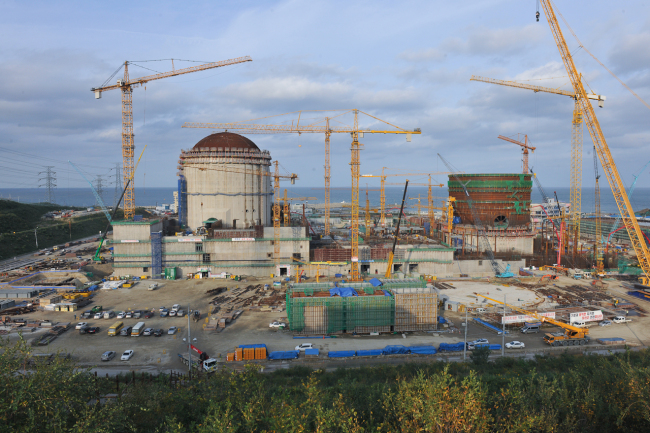ULJIN, North Gyeongsang Province ― The steady progress being made at Shin-Hanul nuclear power plant unit 1 has made it clear that Korea will soon have its first fully indigenously built nuclear facility.
According to Korea Hydro & Nuclear Power, the nation’s nuclear reactor operator, the Shin-Hanul plant in Uljin, North Gyeongsang Province, will become the first to be equipped with an indigenous advanced pressurized reactor that can generate up to 1,400 megawatts of energy.
This reactor will form the climax of Korea’s nuclear power generation history that dates back to 1978, when atomic power was introduced to the country through the Kori power plant constructed by French companies and technicians.
 |
| The construction of Shin-Hanul power plant unit 1 is about 70 percent completed. (Korea Hydro & Nuclear Power) |
Commercial operation of the Shin-Hanul plant unit 1 is scheduled to start in December 2015, while unit 2 is slated for the end of 2016, according to the KHNP.
Officials said the advanced pressurized reactor will also be exported to the United Arab Emirates.
“There will be mild adjustments (made to the reactors) because the UAE’s climate is hotter and drier than that of Korea, but they will otherwise be identical,” said Kim Kyoung-tae of the KHNP.
Korean companies in 2009 landed a $20 billion deal to build four nuclear power plants in the UAE, marking Korea’s first successful export of a nuclear power plant. The first unit in the UAE’s Barakah region is scheduled to begin supplying power in 2017.
The construction of the Barakah plant is also expected to help vitalize the local community there, as about 500 Korean workers are expected to reside there after the plant has been constructed to help with the management.
“About 6,000 of the KHNP and related staff, along with the subcontracted workers, have helped bring a healthy and vibrant change to the quiet village of Barakah,” said Park Wan-kook, general manager of public relations team at the Hanul Nuclear Power Site.
Noting that the site attracts up to 100,000 tourists a year who want to learn about atomic power, Park said he expects the plant in Barakah to get the same kind of attention.
By Bae Ji-sook (baejisook@heraldcorp.com)

